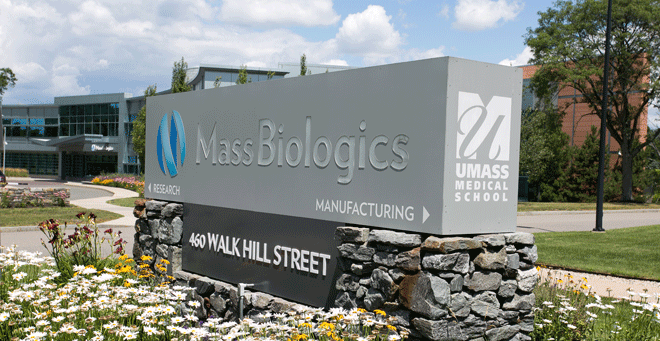 |
|
|
MassBiologics has the experience in antibody expression, development and production to develop a delivery method for an innovative treatment to prevent diarrhea. |
MassBiologics of UMass Medical School has received a $2 million grant from the Bill & Melinda Gates Foundation to develop an oral treatment for enteric (gastrointestinal) diarrheal infections, a leading cause of death for children in the developing world.
About 500,000 children under 5 years old die each year from diarrheal illnesses, many due to enterotoxigenic Escherichia coli (ETEC)—commonly referred to as traveler’s diarrhea in the developed world. ETEC is contracted through contaminated water and food, or lack of sanitation. Children who survive face repeated infections by gut pathogens, which can lead to serious, lifelong health problems. Globally, 159 million children are stunted, which means they face diminished opportunities and productivity over the course of their lifetime.
“Too many children still die from infections, such as enteric E. coli, that are entirely preventable or treatable,” said Mark Klempner, MD, executive vice chancellor for MassBiologics and professor of medicine. “Prevention efforts that focus on immunoprotection, especially in less affluent countries without a stable infrastructure, are an integral part of the strategy to help reduce the incidence and severity of ETEC.”
Funds from the Gates Foundation grant will be used to develop a delivery method and refine manufacturing protocols for an innovative immunoglobulin (Ig) treatment to prevent diarrhea. Found on mucosal areas, such as the intestinal tract, immunoglobulin A (IgA) is an antibody that plays a crucial role in the immune function of mucous membranes by preventing the colonization by pathogens.
“Designed to survive in the harsh gastrointestinal tract environment, IgA serves as a kind of protective barrier, preventing microbes from adhering to epithelial cells lining the digestive tract,” said Lisa Cavacini, PhD, professor of medicine, an internationally recognized expert on IgA and one of the lead investigators on this grant.
Most vaccines, such as the influenza vaccine, rely on the more common IgG antibodies found in blood serum to confer protection to patients. IgG is the most common type of antibody found in the circulation. However, IgG is not effective on mucosal surfaces, while IgA is stabilized by the mucin lining the intestinal tract. Delivery of IgA to treat intestinal pathogens has yet to be fully investigated because of technical limitations in delivery of the antibody orally to the gut as well as a lack of manufacturing protocols for a potential IgA drug.
“The development of protective antibodies that can be easily administered orally would represent a significant advance for prevention of enteric infections,” said Dr. Klempner. “MassBiologics has the experience in antibody expression, development and production to bring a full scale IgA therapeutic to children suffering from illness.”
MassBiologics has seven candidate IgA antibodies that have shown to be effective in animal models. The next step for Klempner and colleagues is to select a suitable antibody for effectiveness and manufacturability.